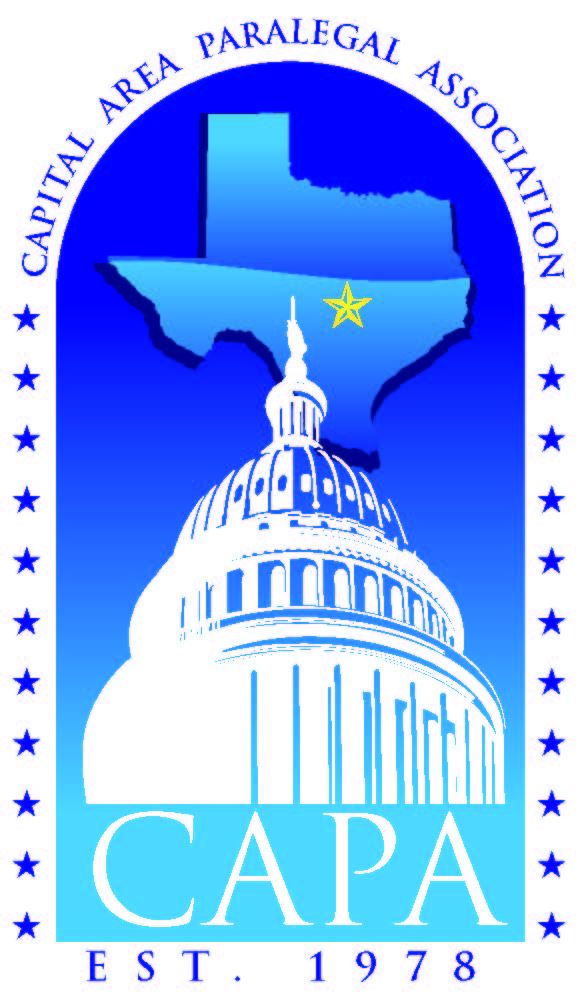| CAPITAL AREA PARALEGAL ASSOCIATION |
What is a paralegal?
"A paralegal is a person, qualified by education, training or work experience who is employed or retained by a lawyer, law office, corporation, governmental agency or other entity and who performs specifically delegated substantive legal work for which a lawyer is responsible.." --Definition adopted by American Bar Association in 2020. "A paralegal is a person, qualified through various combinations of education, training, or work experience, who is employed or engaged by a lawyer, law office, governmental agency, or other entity in a capacity or function which involves the performance, under the ultimate direction and supervision of a licensed attorney, of specifically delegated substantive legal work, which work, for the most part, requires a sufficient knowledge of legal principles and procedures that, absent such person, an attorney would be required to perform the task. --Definition adopted by the State Bar of Texas Board of Directors, the State Bar of Texas Standing Committee on Paralegals, and the Paralegal Division of the State Bar of Texas in 2005.On April 21, 2006, the State Bar of Texas Board of Directors approved amending this definition by including the following standards, which are intended to assist the public in obtaining quality legal services, assist attorneys in their utilization of paralegals, and assist judges in determining whether paralegal work is a reimbursable cost when granting attorney fees: A. Support for Education, Training, and Work Experience:1. Attorneys are encouraged to promote:
2. In hiring paralegals and determining whether they possess the requisite education, attorneys are encouraged to consider the following:
3. Although it is desirable that an employer hire a paralegal who has received legal instruction from a formal education program, the State Bar recognizes that some paralegals are nevertheless qualified if they received their training through previous work experience. In the event an applicant does not meet the educational criteria, it is suggested that only those applicants who have obtained a minimum of four (4) years previous work experience in performing substantive legal work, as that term is defined below, be considered a paralegal. B. Delegation of Substantive Legal Work:"Substantive legal work" includes, but is not limited to, the following: conducting client interviews and maintaining general contact with the client; locating and interviewing witnesses; conducting investigations and statistical and documentary research; drafting documents, correspondence, and pleadings; summarizing depositions, interrogatories, and testimony; and attending executions of wills, real estate closings, depositions, court or administrative hearings, and trials with an attorney. "Substantive legal work" does not include clerical or administrative work. Accordingly, a court may refuse to provide recovery of paralegal time for such nonsubstantive work. Gill Sav. Ass'n v. Int'l Supply Co., Inc., 759 S.W.2d 697, 705 (Tex. App. Dallas 1988, writ denied). C. Consideration of Ethical Obligations (See Note* below):1. Attorney. The employing attorney has the responsibility for ensuring that the conduct of the paralegal performing the services is compatible with the professional obligations of the attorney. It also remains the obligation of the employing or supervising attorney to fully inform a client as to whether a paralegal will work on the legal matter, what the paralegal's fee will be, and whether the client will be billed for any nonsubstantive work performed by the paralegal. 2. Paralegal. A paralegal is prohibited from engaging in the practice of law, providing legal advice, signing pleadings, negotiating settlement agreements, soliciting legal business on behalf of an attorney, setting a legal fee, accepting a case, or advertising or contracting with members of the general public for the performance of legal functions. ************* *Note: a more expansive list is included in the "General Guidelines for the Utilization of the Services of Legal Assistants by Attorneys" approved by the Board of Directors of the State Bar of Texas, May, 1993. |
Updated 2020.03.11
